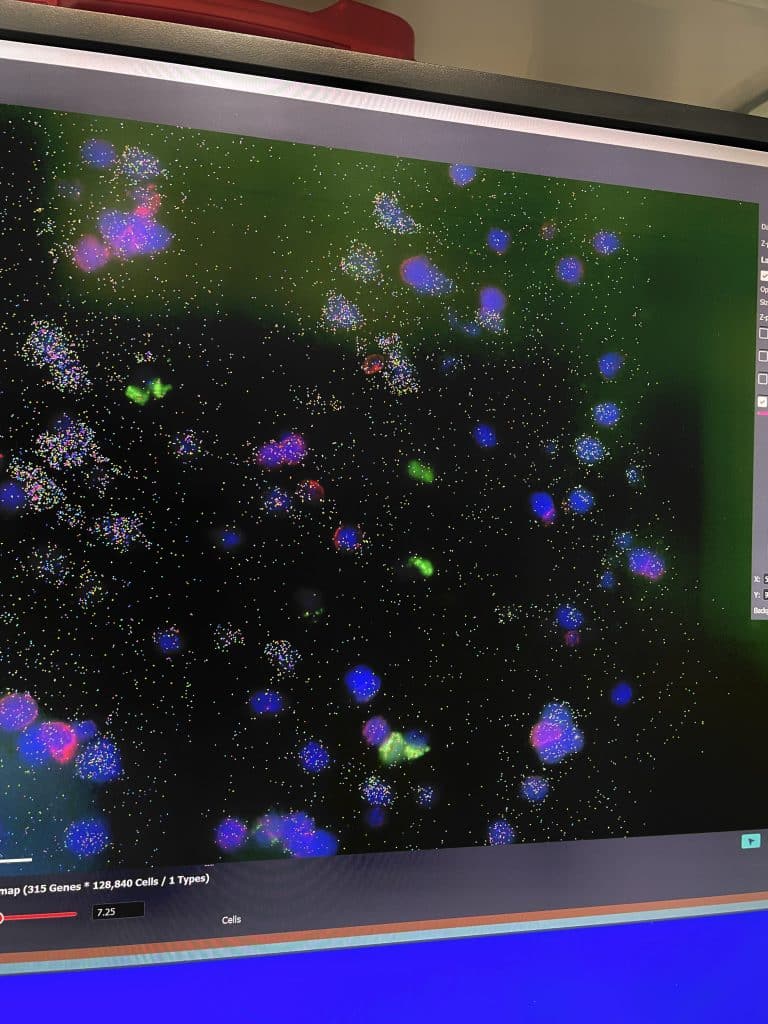Merfish-ing across the Pacific: from New Zealand to California, USA
Posted by Maize Cao, on 12 August 2024
I am an early career postdoc at the University of Auckland (UoA), New Zealand. My research interest is in neurodegeneration and molecular biology, with a focus on RNA biology and omics. My current work is dedicated to people who live with a devasting neurological disorder known as amyotrophic lateral sclerosis (ALS). This disease is usually fatal within 2-5 years after initial symptom onset, with no effective cure. My research is related to untangling the molecular mechanisms that may be involved in the pathogenesis of ALS.
Just before completing my PhD, I began to think of projects I’d like to work on afterwards. One thing I did feel stifled by in New Zealand was the amount of time it takes for new technologies (and scientific reagents in general) to arrive/become established on our little island country. I challenged myself to really chase after the exciting science I wanted to be a part of. Because I had experience with imaging techniques and transcriptomics, naturally, single-cell spatial transcriptomics was something I wanted to learn more about.
I discovered that the technique Merfish, a multiplex single-molecule FISH technique, was now commercialised as a machine called MERSCOPE. I searched for neuroscience labs that owned the MERSCOPE platform and found out about the Xu lab at University California Irvine (UCI), that had two of these machines – so I reached out to Dr. Xu with a project proposal. I asked Dr. Xu if he would be willing to collaborate on the project, on the condition I acquire my own funding for travel and reagents, as well as provide samples from the New Zealand human brain bank, and he kindly agreed.
Fast forward a year after finishing my PhD, and I had gathered enough funding and secured the DMM travelling fellowship to visit UCI. The proposed research was to investigate single-cell spatial transcriptomics of ALS versus control human brain tissue. We sent 5 ALS and 5 control motor cortex samples from the NZ human brain bank over to UCI so we could analyse these precious samples. When I was first introduced to the Xu lab and their incredible facilities, it really opened my eyes up to how powerful and productive science can be with amazing resources. I was very lucky to work with a subset of the Xu lab – Dr. Zhiqun Tan, Dr. Sujan Das and Pei Tan. I feel so grateful they took the time to help me understand Merfish better than any journal article could have. I don’t think this experiment would’ve resulted in data had it not been for their expertise and previous optimisations. I also want to thank their extremely competent lab manager Ginny Wu for helping with the logistics of my visit. There were a couple of hiccups and unexpected occurrences, as can be anticipated with a new technique and sample variability with human post-mortem tissue. But overall, the experience was still invaluable.
I was only at UCI for a short period of time – 2 weeks – as Orange County is a pretty expensive place to stay! But in that short period of time, I gained so much. Between experimentation, I made collaborations with various labs, was invited to join different lab meetings, gave a seminar and received a lot of personalised career advice from professors. The kindness and welcoming nature of the people at UCI was what made the trip an unforgettable experience. Also, the weather was just blue skies every single day, which feels unreal for someone who comes from a place that rains every few days (minimum). It certainly boosts the mood when the sun is always shining!
This visit helped bring my ideas to a reality and we were able to generate high-throughput data, which is always valuable for hypothesis generation and future publications. I am hugely thankful to Dr. Xu for being such a generous host and collaborator, his lab for their invaluable support, and many thanks to The Company of Biologists (Disease Models and Mechanisms Journal) for the travelling fellowship that made this trip possible.



 (No Ratings Yet)
(No Ratings Yet)